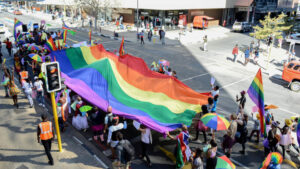LGBTQ Activists Celebrating the Ruling
Landmark Verdict in Windhoek
A top Namibian court delivered a historic verdict on Friday. The court struck down colonial-era laws that criminalized same-sex relationships. This ruling marks a significant victory for LGBTQ rights in southern Africa. The high court in Windhoek declared the laws on “sodomy” and “unnatural sexual offences” unconstitutional and invalid.
Activists Celebrate the Ruling
Local LGBTQ activist Friedel Dausab brought the case. The judges ruled in favor of the activist, stating that criminalizing consensual same-sex activities was unjustifiable in a democratic society. Dausab expressed his relief and joy, saying, “I no longer feel like a criminal in my own country just because of who I am.”
A Step Forward for Democracy
Dausab added, “It is a beautiful day for our democracy, our country, and our constitution.” The London-based Human Dignity Trust, a non-profit organization that supported the legal case, praised the ruling. Its chief executive, Tea Braun, called the decision “historic” and emphasized that it struck down laws enabling stigma and discrimination.
Government Response
The government, represented by Justice Ministry spokesperson Gladice Pickering, stated it was considering the judgment. Pickering had no further comments at this time.
Public Reaction
Local rights group Equal Namibia shared photos online showing people inside the courtroom hugging after the verdict. Dozens of activists stood outside holding placards and banners with messages like “Decolonize My Sexuality” and “Get the Law out of my love life.”
Recent Legal Victories
This ruling represents the latest court victory for Namibia’s LGBTQ community. Namibia has seen numerous cases on the rights of same-sex couples to marry, become parents, and immigrate in recent years. Last year, the Supreme Court ruled that same-sex marriages contracted abroad between Namibian citizens and foreign spouses should be recognized.
Conservative Backlash
However, that ruling angered social conservatives in Namibia. Lawmakers approved new laws to ban same-sex marriage and punish its supporters. These laws are awaiting ratification from the president. Omar van Reenen of Equal Namibia voiced concerns about potential backlash. He said, “We were not worried about whether we would win or lose, but about the backlash from political leaders and religious extremists.”
International Attention
Amnesty International documented “alarming rhetoric” in the run-up to the ruling, threatening the rights of LGBTQ persons. Khanyo Farise, Amnesty’s deputy regional director for East and Southern Africa, urged authorities to ensure the safety of LGBTQ persons in Namibia and to hold accountable anyone who violates their rights.
Regional Context
While a few African countries have legalized same-sex relationships, South Africa remains the only African nation that allows gay marriage, legal since 2006. Legal efforts to improve LGBTQ rights have sparked protests in neighboring Botswana and Malawi over the past year.
High Court’s Jurisdiction
In Namibia, the high court has jurisdiction over constitutional matters. Its decisions can be appealed before the Supreme Court. This latest judgment from the high court marks a significant victory for equality and human rights.
Global Recognition
The United Nations AIDS program, UNAIDS, celebrated the judgment as a “significant victory for equality and human rights.” Anne Githuku-Shongwe, UNAIDS regional director for East and Southern Africa, said, “This decision is a powerful step towards a more inclusive Namibia.” She noted that the colonial-era laws perpetuated discrimination and fear, often hindering LGBTQ+ individuals’ access to essential healthcare services.
The Namibian high court’s ruling against colonial-era laws criminalizing same-sex relationships represents a milestone for LGBTQ rights in Africa. Activists and international organizations celebrate this historic victory, while concerns about potential backlash linger. As Namibia moves forward, the court’s decision paves the way for a more inclusive and democratic society. The fight for LGBTQ rights continues, but this ruling marks a significant step towards equality.





